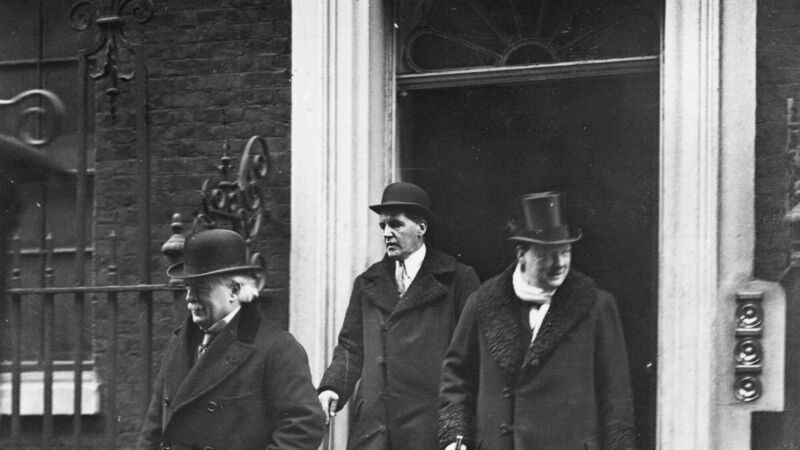Britain was prepared to introduce martial law if Anglo-Irish Treaty talks failed

British prime minister David Lloyd George (far left, 1863-1945) with two of his negotiating team for the Anglo-Irish Treaty, Frederick Smith (1872-1930) and Winston Churchill (1874-1965). Picture: Central Press/Getty Images
The British government readied plans to introduce martial law, suspend civil courts, and enforce press censorship in the event the Anglo-Irish Treaty talks failed 100 years ago, a conference has heard.
In the latest episode of the ‘Glencairn Conversations’, hosted by British ambassador Paul Johnston to mark the centenary of the signing of the Treaty, on December 6, 1921, it was made clear the threat of “immediate and terrible war” by British prime minister David Lloyd George was not an empty threat.
The eve of the talks' conclusion was referenced, whereby Lloyd George waved two letters in front of the Irish negotiators, calling on them to choose “peace or war for your country”.
He told them a special train was waiting “with steam up” at Euston Station. If the Irish rejected, he said, it would be war, “and war within three days”.
In her keynote address, Dr Caoimhe nic Dháibhéid of the University of Sheffield asked the question whether Lloyd George’s threat to the Irish delegation, including Arthur Griffith and Michael Collins, was a bluff.
She set out that official British documents released subsequently showed the extent of contingency planning in the event of the historic talks breaking down.
Dr nic Dháibhéid said the British were readying for martial law in the 26 southern counties and preparing to flood Ireland with extra military forces.
She also said they planned on enforcing press censorship, a policy of closing ports except for Cork and Dublin, and ceasing the civil courts to be replaced with martial courts.
However, she made clear that Lloyd George was keen to avoid any return to violence in Ireland and that he would have resigned or been pushed aside had talks failed.
War would have meant failure, Lloyd George’s private secretary Tom Jones later said.
She concluded in assessing the decision of the Irish delegation not to refer the final decision to Dublin, she said these were real choices, which had to be taken in real time.
Dr Martin Mansergh, former minister and adviser to former taoiseach Charlie Haughey, said it could be argued that the threat of force undermined the legitimacy of the treaty.





